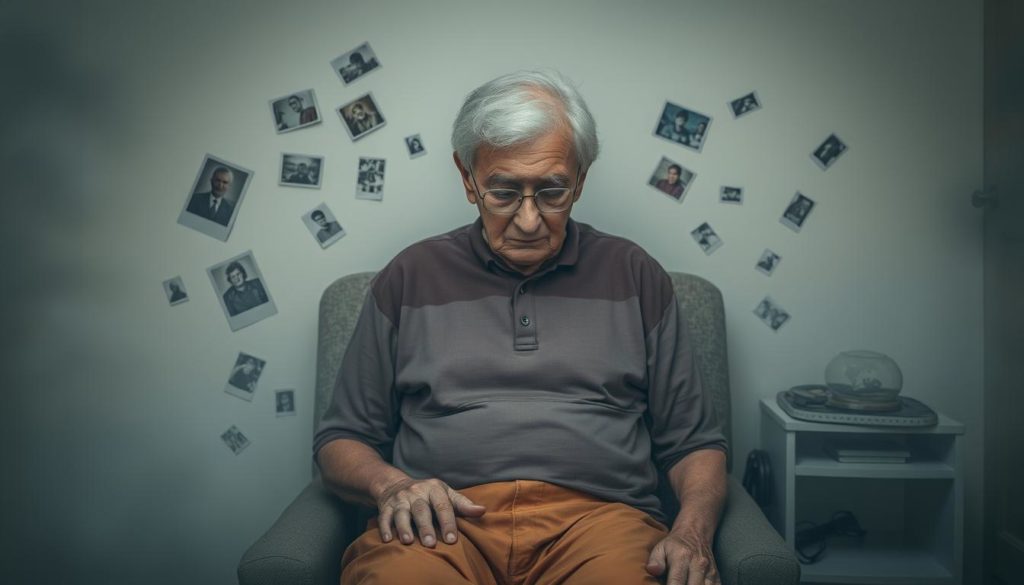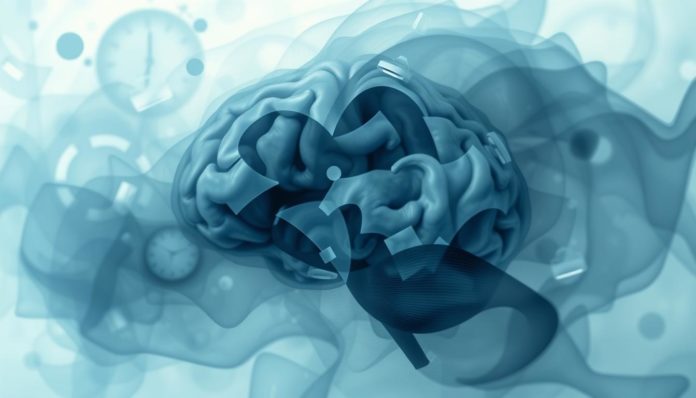Did you know nearly 40% of people with Alzheimer’s also face major anxiety? This link highlights the need for well-rounded care strategies.
Getting to grips with Alzheimer’s and anxiety is key for better lives for patients and caregivers. Cognitive struggles and anxiety often pair up. This makes care challenging. We’ll explore what causes this overlap and how to manage it efficiently.
It’s critical to tackle both Alzheimer’s and anxiety together. Whether you’re caring for someone, love someone affected, or it’s you, understanding this battle is empowering. It helps in offering or finding the best care.
What is Alzheimer’s Disease?
Alzheimer’s disease is a brain disorder that worsens memory, thinking, and behavior. It is the main reason for dementia, affecting many people worldwide. Most people see signs when they are in their mid-60s.
Doctors use medical history, tests, and brain scans to diagnose it. Alzheimer’s gets worse over time, showing more serious cognitive problems:
- Early Stage: Small memory issues, like forgetting names or recent happenings.
- Middle Stage: Major problems with daily tasks, mood swings, and more confusion.
- Late Stage: Big memory loss, trouble knowing family, needing a lot of help.

Alzheimer’s involves buildup of harmful proteins in the brain, harming connections between neurons. This leads to neuron death, worsening mental function and abilities.
It’s key to understand why Alzheimer’s causes much anxiety, as lost memories make patients extra anxious. Around 5.8 million people in the U.S. live with Alzheimer’s, with numbers expected to grow.
Alzheimer’s doesn’t just affect the person, but also their family and caregivers. With ongoing research, there’s hope for better tests, treatments, and supports to help manage the disease and its anxiety symptoms.
Understanding Anxiety in Alzheimer’s Patients
Anxiety is common in Alzheimer’s patients and very distressing. The connection between Alzheimer’s and anxiety is complex. As Alzheimer’s patients lose cognitive abilities, their anxiety levels often go up. Let’s explore the causes and effects of anxiety in Alzheimer’s.
Causes of Anxiety Related to Alzheimer’s
Several factors cause anxiety in Alzheimer’s patients. Changes in the brain due to Alzheimer’s are a main cause. These changes mess up how the brain works and can cause anxiety. Also, feeling upset about losing memory skills can make anxiety worse.

Impact of Anxiety on Cognitive Decline
Anxiety can make cognitive decline worse in Alzheimer’s patients. It makes it hard for them to focus, remember, and make choices. These abilities are already challenged by Alzheimer’s. This shows how important it is to treat anxiety early.
“Anxiety is not only a result of Alzheimer’s but also speeds up cognitive decline,” says neurologist Dr. Jane Smith.
Knowing how Alzheimer’s and anxiety affect each other is key for those caring for patients. Handling anxiety can make life better for Alzheimer’s patients. It eases the pace of cognitive decline.
| Contributing Factors | Impact on Patients |
|---|---|
| Neurological Changes | Trigger anxiety, exacerbate symptoms |
| Emotional Distress | Increase anxiety, affect mental health |
Alzheimer’s Anxiety Symptoms: What to Watch Out For
Knowing Alzheimer’s anxiety symptoms is vital for caregivers and loved ones. Spotting these signs early helps in managing Alzheimer’s and anxiety. We will look into the main behavioral changes, emotions, and physical signs that show up in people with this illness.
Behavioral Changes
Those with Alzheimer’s might start acting differently because of anxiety. These changes can be seen as:
- Restlessness and pacing
- Increased agitation and aggression
- Staying away from social activities
Emotional Responses
Anxiety can really impact how someone with Alzheimer’s feels. You might notice:
- Lots of irritability and anger
- Times when they cry or tear up without any clear reason
- Being more sensitive to stress
Physical Symptoms
Physical signs also show that someone with Alzheimer’s is experiencing anxiety. Look out for:
- Faster heartbeat and palpitations
- A lot of sweating and shaking
- Complaining about stomach pain or other pains without a cause
Noticing these signs of Alzheimer’s anxiety can really help in handling Alzheimer’s and anxiety. It lets caregivers give the right support and care.
The Connection: Alzheimer’s and Anxiety
Alzheimer’s and anxiety are closely linked, affecting each other in many ways. The brain changes caused by Alzheimer’s increase anxiety. This can worsen cognitive problems.
People with Alzheimer’s often feel anxious due to confusion and forgetting things. This anxiety can make Alzheimer’s symptoms worse. Persistent anxiety affects memory and decision-making and speeds up Alzheimer’s.
Chronic anxiety might also trigger Alzheimer’s. Studies show that constant stress and anxiety may cause brain inflammation. This inflammation could speed up Alzheimer’s. Managing anxiety is crucial for Alzheimer’s patients to live better.
It’s important to understand how anxiety and Alzheimer’s influence each other. By helping Alzheimer’s patients with their anxiety, we can slow down their cognitive decline. This improves their quality of life. We need good treatment plans focusing on both conditions.
| Aspect | Impact of Alzheimer’s | Impact of Anxiety |
|---|---|---|
| Cognitive Function | Memory loss, confusion | Increases cognitive decline |
| Behavioral Changes | Disorientation, unpredictable behavior | Exacerbates behavioral issues |
| Brain Inflammation | Neurodegenerative processes | Heightens inflammation, affects neurotransmitters |
| Quality of Life | Reduced due to cognitive impairment | Further diminishes daily functioning |
Understanding Alzheimer’s and anxiety together helps us create better care plans. A complete approach is key for improving lives of patients and caregivers.
The Role of Caregivers in Managing Anxiety and Alzheimer’s
Caregivers play a key role in helping those with Alzheimer’s manage anxiety. They provide emotional support and create a safe space. These actions are essential for the well-being of Alzheimer’s patients.
Providing Emotional Support
Supporting someone with Alzheimer’s involves a lot of empathy, patience, and understanding. Caregivers must listen well, stay calm during tough times, and always offer reassurance. Building a strong emotional bond helps lower anxiety in Alzheimer’s patients.
Creating a Safe Environment
Making a safe and stable environment is key for those with Alzheimer’s. This includes removing anything that might upset them and keeping a regular routine. Homes should be clutter-free to avoid confusion or upset. Simple steps like labeling things clearly can make a big difference.
- Develop Consistent Routines: It’s important to have a daily routine for comfort.
- Reduce Clutter: A tidy living space helps avoid confusion.
- Label Items: Labeling helps patients recognize household items easily.
| Support Strategies | Benefits |
|---|---|
| Empathetic Communication | Reduces patient anxiety |
| Consistent Routines | Provides a sense of security |
| Organized Environment | Minimizes confusion and distress |
Effective Treatments for Alzheimer’s and Anxiety
Handling Alzheimer’s and anxiety at the same time is tough. Finding the right treatments is crucial to help both patients and caregivers. Here, we’ll look at the different options available to manage these conditions.
Medications
- Antidepressants: To ease anxiety in Alzheimer’s, doctors often suggest antidepressants. Drugs like sertraline and citalopram are popular choices.
- Anxiolytics: Drugs such as benzodiazepines can help. But, they must be used with care because of the risk of dependence and side effects.
- Antipsychotics: These might be needed for severe anxiety or delusions. Yet, their side effects limit their use.
- Cholinesterase Inhibitors: Medicines like donepezil and rivastigmine can boost brain function. They also help ease anxiety in those with Alzheimer’s.
Therapies
Medicines are not the only answer. Many therapies offer a whole-person approach to manage Alzheimer’s and anxiety.
- Cognitive Behavioral Therapy (CBT): CBT aims to change negative thoughts and increase coping skills. It’s helpful for Alzheimer’s and anxiety sufferers.
- Occupational Therapy: This therapy keeps Alzheimer’s patients active in daily tasks. It lowers anxiety by creating a routine and a sense of achievement.
- Music and Art Therapy: Engaging in these activities can relax and reduce stress. They are good ways to handle anxiety.
- Group Therapy: Being part of therapy groups offers support and reduces loneliness. It could lessen the anxiety that isolation brings.
Using both drugs and therapy offers a complete way to treat Alzheimer’s and anxiety. This mix addresses symptoms better. It also improves life for patients and caregivers, making daily challenges easier to face.
Natural Ways to Manage Alzheimer’s and Anxiety
There are natural ways to help those with Alzheimer’s and anxiety. Simple lifestyle changes and holistic techniques can improve life quality. They can ease symptoms effectively.
Diet and Exercise
Eating a diet with plenty of fruits, vegetables, and omega-3s supports brain health. It also reduces anxiety. Regular physical activities like walking or yoga improve mental and physical well-being. They help keep the mind sharp.
- Antioxidant-rich foods: Berries, nuts, and green leafy vegetables help fight oxidative stress.
- Fatty fish: Salmon, mackerel, and sardines are excellent sources of Omega-3, which is crucial for brain health.
- Regular physical activity: Aim for at least 30 minutes of moderate exercise daily to enhance mood and cognitive functionality.
Mindfulness and Relaxation Techniques
Adding mindfulness and relaxation techniques to daily life is beneficial. Techniques like meditation, breathing exercises, and yoga reduce stress and anxiety. They make you feel calmer and improve mental health.
| Technique | Benefits |
|---|---|
| Meditation | Increases focus and reduces stress levels. |
| Breathing exercises | Enhances relaxation and lowers anxiety symptoms. |
| Yoga | Improves physical flexibility and mental clarity. |
Using these natural methods, people can support their Alzheimer’s and anxiety management. These strategies may help slow cognitive decline. They lead to a more balanced and peaceful life.
Professional Support for Alzheimer’s and Anxiety
Alzheimer’s and anxiety are tough to deal with. But, getting help from experts is key. Neurologists and psychiatrists play a big part. They give patients the special care they require.
Consulting Specialists
When you visit specialists like neurologists, they offer care just for you. They find out what’s wrong and make a care plan that fits your needs. Psychiatrists also play a role. They use therapy and sometimes medicine to ease anxiety.
- Comprehensive assessments
- Personalized treatment plans
- Medication management
Support Groups and Resources
Support groups are great for patients and their caregivers. They’re a place to share stories and get advice from people who understand. They offer comfort and useful tips. Also, you can find helpful materials and programs in your community.
- In-person support groups
- Online forums and communities
- Educational materials and workshops
| Type of Support | Benefits |
|---|---|
| In-person support groups | Facilitate face-to-face interaction, providing a sense of community |
| Online forums | Offer 24/7 availability and access to a global community |
| Educational materials | Provide valuable information and tips for managing symptoms |
Finding the right professional support for Alzheimer’s and anxiety is essential. Good medical care or help from the community can greatly improve life for those affected.
Stories from Caregivers: Coping with Alzheimer’s and Anxiety
Caregivers in the United States face big challenges with Alzheimer’s. They deal with their loved one’s anxiety, too. These stories show how they cope and stay strong.
Many caregivers talk about how hard Alzheimer’s is on everyone. It’s tough to balance caring with their emotional health. They need lots of patience and dedication.
Maria cares for her mom and shares,
“Every day brings new challenges. Sometimes, Mom is happy. Other times, she’s very anxious. I remember her anxiety isn’t my fault. It’s part of her disease.”
Alan found help in support groups. He says,
“A support group changed everything for me. I learned new ways to cope and felt less alone. It was a big help.”
Taking care of themselves is key for caregivers. This lets them help their loved ones better:
- Exercise regularly – It lowers stress and keeps you healthy.
- Seek emotional support – Talking to others offers relief.
- Take breaks – Short rests are refreshing for caregivers.
Grace cares for her husband. She finds that laughter helps. She says,
“Laughing together lightens the load. It doesn’t cure Alzheimer’s, but it eases the journey.”
The stories from caregivers offer more than advice. They give a sense of community. Sharing their experiences helps everyone facing Alzheimer’s.
Future Research and Advances in Alzheimer’s and Anxiety Treatment
Medical science is rapidly advancing. This makes learning how Alzheimer’s and anxiety treatments interact very important. Around the globe, organizations are focusing on new research. Their goal is to find new ways to help patients better.
Ongoing Clinical Trials
Clinical trials are key to improving Alzheimer’s and anxiety treatments. They test different medications and therapies to see what works best. For instance, studying drugs that target amyloid plaques could majorly prevent the mental decline seen in Alzheimer’s patients.
| Clinical Trial | Focus | Current Phase |
|---|---|---|
| Project X | Drug to reduce amyloid plaques | Phase II |
| Project Y | Therapy for anxiety relief | Phase III |
Innovative Therapeutic Approaches
Future treatments for Alzheimer’s and anxiety are also looking at new methods. They’re exploring tech like virtual reality to soothe patients. Personalized medicine, which adjusts treatment to each person’s genes, is another area of focus. These steps could change how diseases are treated, making a big difference.
By focusing on new research, experts are finding important discoveries. This can lead to powerful treatments for Alzheimer’s and anxiety. Making progress in these fields could greatly help those in need.
Final Thoughts on Living with Alzheimer’s and Anxiety
Living with Alzheimer’s and anxiety is tough. It needs a caring and detailed approach. Knowing the symptoms, what starts them, and how to manage anxiety in Alzheimer’s, helps a lot. These steps can make life better for those dealing with these issues. The impact on emotions and physical health can be huge, but help is available.
Support for Alzheimer’s and anxiety isn’t just about medicine or therapy. It includes love and help from caregivers, family, and medical teams. Creating a safe and caring space helps reduce stress and fear for Alzheimer’s patients. Caregivers play a key role in giving both physical and emotional support.
There is hope thanks to ongoing research and new treatments being found. Keeping up support, learning, and spreading awareness is key in handling Alzheimer’s and anxiety. By being aware and active, we can really help those facing these tough conditions. We can make sure they are treated with respect and get the care they need.
FAQ
What is the relationship between Alzheimer’s and anxiety?
Alzheimer’s and anxiety often go hand in hand. The cognitive decline from Alzheimer’s can make people more anxious. Also, dealing with memory loss and other symptoms can increase anxiety levels even more.
How common is anxiety among Alzheimer’s patients?
Anxiety is pretty common in those with Alzheimer’s. It is estimated that up to 40% of these individuals may have significant anxiety symptoms during their illness.
What are the symptoms of anxiety in Alzheimer’s patients?
Anxiety symptoms in these patients can involve changes in behavior, such as being restless or agitated. They might also show emotional signs like irritability or crying easily. Physically, they could have a faster heartbeat or sweat more.
How does anxiety impact cognitive decline in Alzheimer’s patients?
Anxiety can make cognitive decline worse. It adds mental stress, which can affect memory and thinking processes. This can speed up Alzheimer’s progression.
What strategies can caregivers use to help manage anxiety in Alzheimer’s patients?
Caregivers can help by giving emotional support and creating a calm, stable home. Making sure the person stays active and keeping to a regular daily schedule can also help lower anxiety.
Are there medications available to treat anxiety in Alzheimer’s patients?
Yes, medications can help with anxiety in Alzheimer’s patients. These include antidepressants and anti-anxiety drugs. But, a doctor must prescribe them and keep a close eye on the effects.
What natural methods can help manage anxiety in Alzheimer’s patients?
Some natural ways to manage anxiety include eating healthy, staying active, and practicing mindfulness. Things like meditation, yoga, and deep breathing exercises can be especially helpful.
Can professional support improve the quality of life for Alzheimer’s patients with anxiety?
Absolutely. Getting help from doctors and joining support groups offers valuable help and coping methods. This significantly improves patients’ and caregivers’ lives.
What are some future research directions for Alzheimer’s and anxiety treatment?
Future research is looking into new clinical trials and treatments for Alzheimer’s and anxiety. This could lead to better ways to handle these conditions together.
Why is it important to address both Alzheimer’s and anxiety concurrently?
Treating both at the same time is vital. Managing anxiety can make people feel better overall and may slow down Alzheimer’s, leading to a better life quality.


